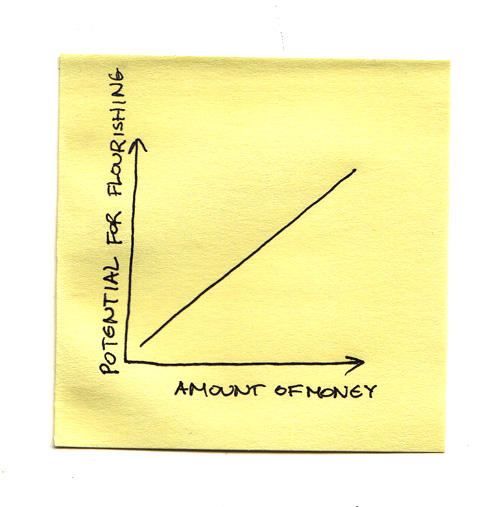We all have heard that money does not buy happiness. Clearly, lots of rich people are quite unhappy. And yet, it is quite clear that not having money is highly correlated with unhappiness. Brainpickings has a review of an interesting book on “How to Worry Less About Money”, which contains these two interesting graphs.

This one, we’re probably all familiar with. Everyone who wants to give “gyaan” says this.
However, here is the other graph, which I found more interesting:

The graph for “potential for flourishing” does not flatten out like the graph for “happiness”.
What is “flourishing”?
Flourishing means getting on with the things that are important for you to do, exercising your capacities, actively trying to “realize” what you care about and bring it into life. But these activities involve anxiety, fear of failure and setbacks, as well as a sense of satisfaction, occasional triumphs and moments of excitement.
Basically, the higher levels of Maslow’s Hierarchy of needs.
But, the key thing to realize is that while the potential for flourishing is directly proportional to the amount of money, money is not the cause of flourishing, it is just one ingredient. Money needs to be combined with a lot of other things before it can help us flourish.
And the first step is to separate our wants from our needs.
Sometimes we need to lessen our attachment to the middle needs like status and glamor in order to concentrate on higher things. This doesn’t take more money; it takes more independence of mind.
It is important to realize that wants vs. needs is not the same as saying that you should buy only inexpensive things, or only basic/simple things. Sometimes, you need expensive things. How much you need something is often independent of how much it costs. You need to keep track of the difference between price and value.
Price is a public matter — a negotiation between supply and demand. A thing’s price is set in competition. So the price of a car is determined by how much some people want it, how much they are willing to pay, and how ready the manufacturer is to sell. It’s a public activity: lots of people are involved in the process, but your voice is almost never important in setting the price.
Value, on the other hand, is a personal, ethical and aesthetic judgment — assigned finally by individuals, and founded on their perceptiveness, wisdom and character.
Read the full review.